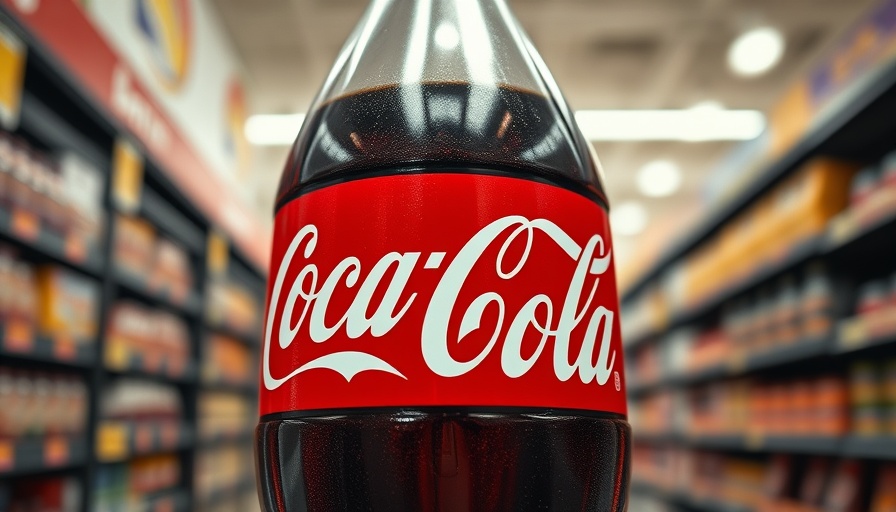
Trump's Soda Strategy: A Sweet Swap for Coca-Cola
In a surprising announcement, former President Donald Trump declared that Coca-Cola has reached an agreement to transition from using corn syrup to real cane sugar in its U.S. operations. This change, as Trump touted on Truth Social, aims to replicate the taste many know and love from Mexican Coca-Cola, which is traditionally made with cane sugar. But what does this mean for American consumers and the larger beverage industry?
The Allure of Mexican Coke
The popularity of Mexican Coca-Cola has skyrocketed in the United States, particularly among consumers seeking an authentic soda experience free from high-fructose corn syrup (HFCS). Ingredients matter to many soda lovers, and cane sugar is often preferred for its cleaner taste. With this announcement, Trump positions himself as catering to consumer demands, particularly those who are increasingly conscious of what they consume.
Consumer Demand for Authenticity is Growing
This trend occurs as consumers increasingly express a desire for authentic, less processed food and beverage options. Amid ongoing shifts in consumer preferences, brands are starting to respond. The Make America Health Again initiative under Trump’s administration also highlights this shift, prioritizing the removal of artificial ingredients across various food products. Major companies like PepsiCo and General Mills are taking steps toward cleaner products as part of a broader movement toward health-conscious offerings.
The Potential Impact on Coca-Cola's Market
Though Coca-Cola has confirmed that changes are on the horizon, the specifics remain vague. Observers are curious about how this initiative will affect the company’s market share and stock price. However, Coca-Cola’s stock, which remained steady at $69.27 following the announcement, suggests investors are cautious but not overly concerned about immediate fallout. Should Coca-Cola succeed in adopting cane sugar entirely, it could play a crucial role in boosting its image and capturing more of the market share currently held by its competitors who already provide similar offerings.
Navigating Economic Challenges
Consumers are navigating a challenging economic landscape, where inflation and rising costs threaten discretionary spending. This announcement could be perceived as a strategic move to maintain brand loyalty among consumers keen on flavor and quality. However, Coca-Cola has long relied on corn syrup due to government subsidies that make it a more economical choice. Switching to cane sugar could introduce a price increase for consumers, and the beverage giant will need to tread carefully to balance flavor with affordability.
Criticism and Skepticism Surrounding the Announcement
While Trump’s announcement has generated buzz, skepticism remains regarding the feasibility of this transition. Coca-Cola has not publicly confirmed the terms of the deal, raising questions about its authenticity and long-term viability. Critics might argue that such promises are merely performative amid a political agenda aimed at appealing to certain voter demographics. Genuine change often takes time, and stakeholders will want to see tangible results indicating progress.
The Broader Context: Economic Trends and Consumer Preferences
As consumers increasingly prioritize health and sustainability, all industries, including beverages, must adapt to meet these changing demands. With the global beverage market projected to evolve significantly by 2025, Coca-Cola’s adjustment toward cane sugar could be strategically timed. Companies that remain responsive to shifting consumer preferences may thrive, while those that don’t may struggle to keep up.
Overall, America’s appetite for authentic, quality products is driving change at major corporations. With industry behemoths like Coca-Cola making adjustments, small businesses may feel the ripple effects—potentially inspiring a wave of product innovation and adaptation. The future landscape of the beverage market could thus see a blend of nostalgia and modernity, appealing to both traditional and contemporary tastes.
Takeaway: A Strategic Shift for Coca-Cola?
As this story unfolds, one thing is clear: consumer preferences are evolving, and companies need to adapt to those changes to survive and thrive. Whether this proposed deal will come to fruition remains to be seen, but it does signal a potentially transformative moment that could reshape Coca-Cola’s brand identity and influence market trends in 2025 and beyond. Stay informed on the latest business developments that may impact your purchasing decisions and preferences in a rapidly changing market.
 Add Row
Add Row  Add
Add 




 Add Row
Add Row  Add
Add 

Write A Comment